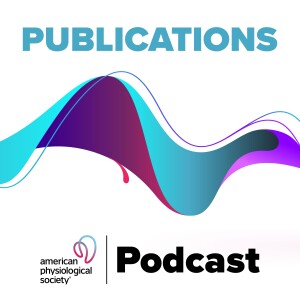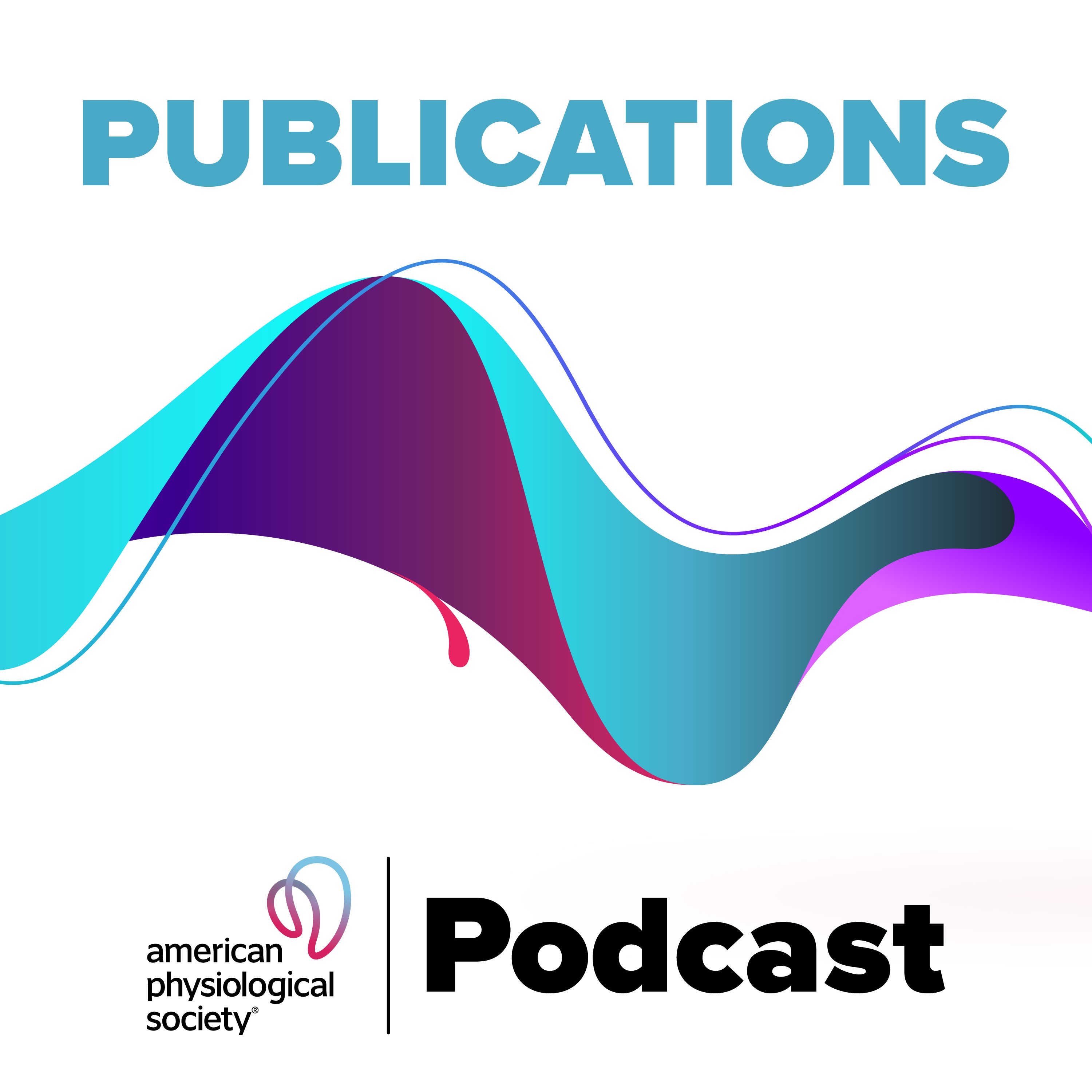Episodes

Monday Dec 01, 2025
Monday Dec 01, 2025
In this podcast, coauthors Maria Magdalena Quetglas-Llabrés and Manuel Jiménez-García discuss their recently published article, ‘Effects of Combining Exercise and Dietary Shifts on Motor Coordination and Oxidative Markers in a High-Fat Diet Model in Rats.' The article investigated the effect of exercise, alone or with dietary modifications, on high fat diet–induced outcomes in rats of both sexes. Authors overview the methodological approach and discuss key takeaways and next steps.
Effects of Combining Exercise and Dietary Shifts on Motor Coordination and Oxidative Markers in a High-Fat Diet Model in Rats
Manuel Jiménez-García, Maria Magdalena Quetglas-Llabrés, Maria Del Mar Ribas-Taberner, Antoni Sureda-Gomila, David Moranta-Mesquida, Silvia Tejada-Gavela
Comprehensive Physiology 2025;15(6):e70074

Wednesday Nov 26, 2025
Wednesday Nov 26, 2025
In this episode of the APS Publications Podcast, featuring Advances in Physiology Education, coauthors Anna Smith, Fran der Weduwen, and Thomas Powell discuss their recently published Illuminations paper “The practical skills passport: a co-curricular program to enhance lab skills confidence in undergraduate neuroscience and biology students”. The COVID-19 pandemic limited in-person lab opportunities, impacting students’ skills and confidence. This episode explores the development, implementation, and evaluation of a co-curricular lab skills program designed to help students regain confidence during their return to in-person learning. Findings show that participation in the program had a positive impact on student lab confidence.
Anna E. Smith, Fran der Weduwen, Thomas Powell, and Gayle Doherty
Advances in Physiology Education 2025 49:3, 696-703

Friday Nov 21, 2025
Friday Nov 21, 2025
In this episode of The APS Publications Podcast, featuring Advances in Physiology Education, Prof. S. Mehran Hosseini discusses the study, “Misconception about the application of Dalton’s Law in respiratory physiology.”
Dalton’s Law may provide a good example for students to highlight the existence of misconceptions and their effect on gaining new knowledge. The awareness of students about this misconception may improve their learning styles.
Misconception about the application of Dalton’s Law in respiratory physiology
S. Mehran Hosseini
Advances in Physiology Education 2025 49:3, 646-650

Tuesday Nov 04, 2025
Connecting Genes to Physiology: The First 25 Years of Physiological Genomics
Tuesday Nov 04, 2025
Tuesday Nov 04, 2025
In this special episode of the APS Publications Podcast, the founding of Physiological Genomics is discussed in a series of interviews with Drs. Allen W. Cowley, Jr., Bina Joe, and Hilary Coller. These interviews were organized and conducted in September 2025 by Oluwatosin Mautin Akinola (PhD candidate in Molecular Medicine at the University of Toledo, Toledo, OH, United States; https://www.researchgate.net/profile/Oluwatosin-Akinola-2). Full videos of these interviews are available as Supplemental Material in the article.
Joe B, Cowley AW, Garrett MR, Kriegel AJ, Prokop JW, Lee EC, Akinola OM, Coller HA. Connecting Genes to Physiology: The First 25 Years of Physiological Genomics. Physiol Genomics. 2025 Oct 29. doi: 10.1152/physiolgenomics.00207.2025. PMID: 41159925.

Friday Oct 31, 2025
Friday Oct 31, 2025
In this episode of The APS Publications Podcast, featuring Advances in Physiology Education, Dr. Raju Suresh Kumar discusses a novel, hands-on simulation designed to teach auditory physiology. By experiencing unilateral conductive hearing loss, students gain deeper insight into auditory masking and sound lateralization. This simple, cost-effective method enhances conceptual understanding and clinical skills, offering strong potential for integration into medical education.
Raju Suresh Kumar, M. Ganesh Kamath, Rekha Prabhu, and Mohamed Eldigire Ahmed
Advances in Physiology Education 2025 49:3, 689-695

Thursday Oct 30, 2025
Interorgan Insights: Alcohol-Induced Pathophysiological Outcomes
Thursday Oct 30, 2025
Thursday Oct 30, 2025
In this podcast, coauthors Liz Simon, Flavia Souza-Smith, Megan Donovan, Eden Gallegos, Kaitlin Couvillon, and Patricia Molina summarize their recently published review article, "Physiological Mechanisms Vulnerable to Alcohol-Induced Alterations: Role in Chronic Comorbidities." The article describes alcohol's multi-systemic physiological effects on the gastrointestinal, cardiovascular, and immune systems, as well as on energy metabolism that contribute to multiorgan injury and disease burden.
Physiological Mechanisms Vulnerable to Alcohol-Induced Alterations: Role in Chronic Comorbidities
Liz Simon, Kaitlin E. Couvillion, Meagan E. Donovan, Eden M. Gallegos, Flavia M. Souza-Smith, Patricia E. Molina
Comprehensive Physiology 2025 15:5, e70057

Tuesday Oct 07, 2025
Tuesday Oct 07, 2025
In this podcast, coauthors Simon D. Pouwels and Brady Rae discuss their recently published research article, "Interorgan Communication Between Lung and Colorectal Epithelial Cells Studied Using a Novel Multi-Organ-On-Chip System." The article describes development of a novel unidirectional millifluidic multi-organ-on-chip device to study the communication between human lung epithelial cells and colorectal cells following a toxic stimulus. Authors additionally discuss the versatility of the device to study communication across other cell types.
Interorgan Communication Between Lung and Colorectal Epithelial Cells Studied Using a Novel Multi-Organ-On-Chip System
Brady Rae, Verena Bood, Hye-Jin Dijk, Gwenda F. Vasse, Barbro N. Melgert, Anika Nagelkerke, Janette K. Burgess, Dirk-Jan Slebos, Irene H. Heijink, Simon D. Pouwels
Comprehensive Physiology 2025 15:5, e70051

Monday Aug 11, 2025
In Vivo Drosophila Model of CS-induced COPD Phenotypes
Monday Aug 11, 2025
Monday Aug 11, 2025
In this episode of the APS Publications Podcast, featuring an article from AJP–Regulatory, Integrative and Comparative Physiology, author Periklis Marnas discusses inhalation exposure of adult D. melanogaster to cigarette smoke and changes in physiological parameters and the expression of COPD-associated orthologous genes. The study found that transcriptomic responses were more profound in females, indicating sex-specific responses to inhaled toxicants. Furthermore, enrichment analyses of the differentially expressed genes in females pointed to biomolecules associated with response to nicotine and detoxification. D. melanogaster thus provides a powerful model system to test the efficacy of new potential drugs for COPD treatment.
Marnas P, Lüpold S, Giannakou L, Giannopoulos AS, Hatzoglou C, Gourgoulianis KI, Zarogiannis SG, Rouka E. Modeling COPD in Drosophila melanogaster by cigarette smoke inhalation: functional changes and alterations in the expression of COPD-relevant orthologous genes. Am J Physiol Regul Integr Comp Physiol. 2025 Jul 1;329(1):R13-R19. https://doi.org/10.1152/ajpregu.00056.2025

